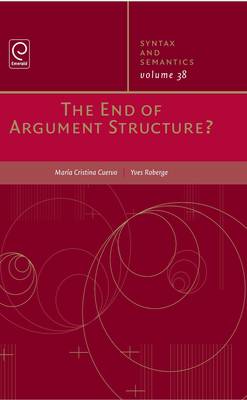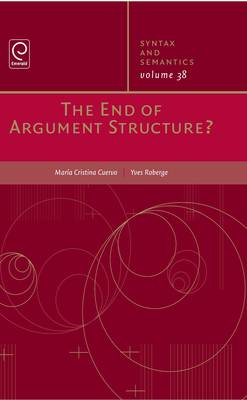
Je cadeautjes zeker op tijd in huis hebben voor de feestdagen? Kom langs in onze winkels en vind het perfecte geschenk!
- Afhalen na 1 uur in een winkel met voorraad
- Gratis thuislevering in België vanaf € 30
- Ruim aanbod met 7 miljoen producten
Je cadeautjes zeker op tijd in huis hebben voor de feestdagen? Kom langs in onze winkels en vind het perfecte geschenk!
- Afhalen na 1 uur in een winkel met voorraad
- Gratis thuislevering in België vanaf € 30
- Ruim aanbod met 7 miljoen producten
Zoeken
The End of Argument Structure
€ 101,95
+ 203 punten
Omschrijving
A central question in the study of language concerns the mechanisms by which the participants in an event described by a sentence come to occupy their positions and acquire their interpretation. The papers included in this volume explore current issues and re-assess generally accepted premises on the relationship between lexical meaning and the morphosyntax of sentences by confronting two competing approaches to this issue. A long-standing approach is based on the assumption that it is the lexical meaning of a verb that determines, albeit indirectly, the basic properties of sentence structure at the level of verbal meaning, including asymmetric relations, thematic roles, case, and agreement. An alternative approach claims that, to a large extent, the syntax itself establishes possible verbal meanings on the basis of the legitimate relations that can exist between syntactic heads, complements, and specifiers. Amharic, Catalan, Chamorro, Chukchee, English, Georgian, Inuit, Korean, Malagasy, Slovenian and Spanish, are among the languages used to provide empirical evidence and illustrate the argumentation.
Contributors are: Víctor Acedo-Matellan, Grant Armstrong, Mark Baker, David Basilico, María Cristina Cuervo, E. Matthew Husband, Kyumin Kim, Terje Lohndal, Tatjana Marvin, Jaume Mateu, Mercedes Pujalte, Yves Roberge, Andrés Saab, and Lisa Travis.
Contributors are: Víctor Acedo-Matellan, Grant Armstrong, Mark Baker, David Basilico, María Cristina Cuervo, E. Matthew Husband, Kyumin Kim, Terje Lohndal, Tatjana Marvin, Jaume Mateu, Mercedes Pujalte, Yves Roberge, Andrés Saab, and Lisa Travis.
Specificaties
Betrokkenen
- Uitgeverij:
Inhoud
- Aantal bladzijden:
- 312
- Taal:
- Engels
- Reeks:
- Reeksnummer:
- nr. 38
Eigenschappen
- Productcode (EAN):
- 9781780523767
- Verschijningsdatum:
- 2/05/2012
- Uitvoering:
- Hardcover
- Formaat:
- Genaaid
- Afmetingen:
- 150 mm x 231 mm
- Gewicht:
- 598 g

Alleen bij Standaard Boekhandel
+ 203 punten op je klantenkaart van Standaard Boekhandel
Beoordelingen
We publiceren alleen reviews die voldoen aan de voorwaarden voor reviews. Bekijk onze voorwaarden voor reviews.








